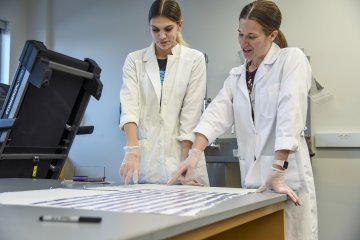
Social Work: Dr. Sarah Keesom, students, make surprising discoveries about social interaction and health
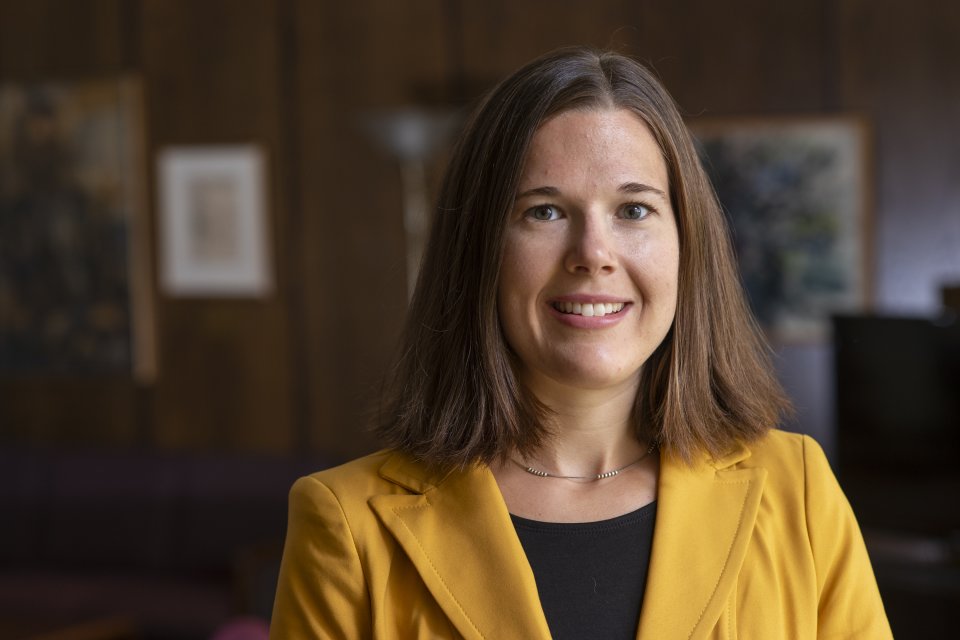
Dr. Sarah Keesom, Associate Professor of Biology
Between conducting the actual research and presenting at scientific conferences, involving our students in this research project provides irreplaceable opportunities for experiential learning, while also contributing to a new scientific understanding of how social interaction contributes to an individual's overall health.
Whether or not you’ve ever contracted COVID-19, it’s likely the pandemic has had an impact on your health. The months of lockdown, the stress and fear, and the disruption to our daily routines have affected us in ways that even the world’s top scientists have only just begun to explore.
One important part of that research: social isolation’s impact on fertility. That’s what a team of Utica University researchers are working to understand. Using female mice and studying the physiological differences between mice kept in isolation and social housing, the research team, led by Associate Professor of Biology Sarah Keesom, has made some surprising discoveries that may help lead to a new understanding of how social interaction impacts hormones, reproductive function, and overall health.

Q: How did this research project start?
Sarah Keesom: I started this research project in Spring 2021 with my Animal Physiology students, and since then, we have had two other semesters’ worth of students working on the project (Fall 2021 and Fall 2022). Along with those students who have taken, or are currently taking BIO 324, we also have other students working on this project as independent research (not part of the course). All in all, we have had over 40 students working on this research!
This research being conducted in collaboration with many students and two of my faculty colleagues, Professor of Biology Terri Provost and Distinguished Professor of Biology Adam Pack. What makes this research most impressive is that the majority of students working on the project are doing so as part of the BIO 324 Animal Physiology laboratory course. In other words, students are conducting real research within one of the classes they take for their major (Biology major or Animal Behavior major).
Q: Your research is all about social isolation and its effect on physical and mental health. Why explore this topic, and what makes it especially relevant now?
SK: I have a background in studying how reduced social contact influences both the brain and behavior, and I started this particular research project with my Animal Physiology students because I was thinking about the social distancing measures employed during the COVID-19 pandemic. Recall that early on in the pandemic, social distancing and stay-at-home work orders were central to the public health strategy used to reduce the transmission of COVID. These are effective measures for controlling the spread of COVID; however, social distancing also leads to increased experiences of isolation and loneliness, which can have negative effects on a person’s well-being. Despite this understanding, less is known regarding how social isolation affects female animals, especially female health. We are using mice to address this gap in knowledge with our research, because mice are social animals, and because we can experimentally alter the social environment of a mouse by placing a mouse into a cage alone or in a social group with other mice.
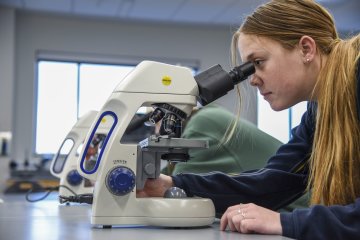
Q: What specific aspects of female health are you looking at?
SK: We have many projects being conducted within this framework. One of our major research goals is to investigate how social isolation affects female reproductive health, including reproductive cycling, reproductive hormones, the structure of the ovaries, and production of offspring. Another group of projects is investigating how social isolation affects energy balance and metabolism in females, including food consumption, sucrose preference, metabolic rate, blood sugar, and digestive health. Finally, I also have students working on projects investigating how social isolation affects anxiety and memory.
Q: It's impressive that undergraduate students are working on research at this level!
SK: That’s right. This is high-quality research that students have presented at conferences, including an international science conference, Experimental Biology, in April 2022 in Philadelphia and a regional conference, Developmental Biology New York, in November 2022. Between conducting the actual research and presenting at scientific conferences, involving our Biology and Animal Behavior students in this social isolation research project provides our students with irreplaceable opportunities for experiential learning, while also contributing to a new scientific understanding of how social interaction contributes to an individual's overall health. It’s very exciting!
Curious Findings
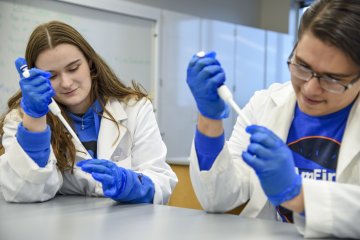
Dr. Sarah Keesom and her students began their experiments expecting to discover that social isolation, like other emotional stressors, would have a negative impact on female fertility in mice. Their initial findings suggest the opposite. Student researchers Nathan Rice ’24 and Lexi Lumley ’24 are busy exploring why that is—and what it may tell us about female reproductive health in general.
Q: How did you discover that social isolation had this kind of fertility-enhancing impact on female mice?
Nathan Rice: We examined the ovaries of two groups of mice — one group that was kept in isolation and one that was not — and looked at the cross section of the ovaries and determined follicle density. We didn’t see a change in the number of ovarian follicles, but a change in the cross-sectional diameter. This is likely because socially isolated mice had follicles of a larger diameter, which would indicate that they are more fertile. What we typically see with a stress response is a down regulation of hypothalamic gonadal hormones which would decrease fertility, but that didn’t happen here.
Lexi Lumley: Additionally, in our preliminary research, we found that the mice that were housed individually had larger litters than the mice that were housed in groups, suggesting that social isolation may instead be triggering a mechanism that would upregulate the production of luteinizing hormone and follicle-stimulating hormone, the hormones responsible for ovulation and egg quality.
Q: What makes this type of research important?
NR: This is an area of reproductive function that we don’t know a lot about, so to be exploring this, especially in a female model organism, is really unique. Plus the fact that the observed findings are not what we expected. Our results could indicate that the current paradigm may not be telling the full story of how this emotional stressor is regulating hormonal function.
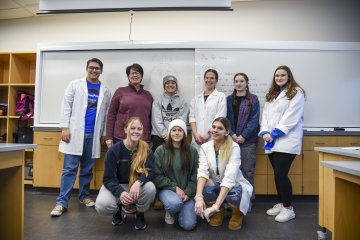
Q: What has this project meant to you, personally?
NR: Through this research I’ve learned a lot about how science works—how long it takes, how often things don’t go how you wanted, how the unexpected can happen. Doing this work has helped me understand how science is always subject to change if and when evidence comes up that doesn’t support what the present idea is. Science is malleable. It's much less of a body of knowledge and much more of a tool we use to better understand the world. That’s the fun and invigorating part of the scientific process, and it’s been amazing to be a part of that.
LL: This research has helped inform my future career goals by allowing me to explore various stressors and other aspects of physiology outside of the neuroscience research I conduct. It has given me valuable experience writing research proposals, designing experimental groups, and interpreting results. At the beginning of November, I presented a poster of our research on how social isolation impacts litter size in mice at Developmental Biology New York, hosted at Ithaca College. This work has also taught me to be flexible with my research, as not everything works perfectly, and adaptability is an important skill to have as a scientist.
Learn More:
More Stories

Keep Looking Up: Sydney Kinsella ’26
For centuries, human beings have looked to the stars in search of meaning. Sydney Kinsella ’26, along with her...
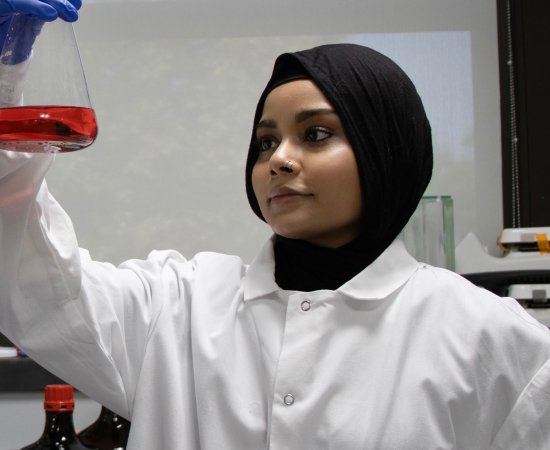
From Malaysia to Masonic (and beyond)
A Rohingya refugee naturalized as a U.S. citizen in 2025, Nurhaliza Syukur ’26 was born and raised in Malaysia, coming to the United States in 2019 with aspirations of a career in medicine.

Big little sister
Dr. Franits' book examines texts and other artistic works rendered by siblings of individuals with disabilities, interrogating the impact of disability on the identity of non-disabled siblings.
I would like to see logins and resources for:
For a general list of frequently used logins, you can also visit our logins page.
